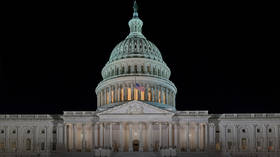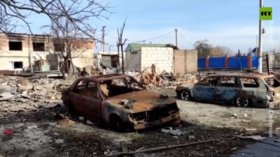Not your pawns: Senate’s Armenian genocide resolution is doing the right thing for the wrong reasons

After over 70 years of refusing to recognize the Armenian genocide for political reasons, US Congress suddenly changed its mind – also for political reasons, leaving actual Armenians entirely forgotten amid the virtue-signaling.
Between the outbreak of the First World War in 1914 and the establishment of the Turkish republic in 1923, the Ottoman Empire systematically targeted Armenians, Assyrian Christians and Greeks for expulsion, robbery and murder. Estimates of Armenian deaths alone vary from 700,000 to 1.8 million. Ever since, the Turkish authorities have denied that genocide – a word coined much later, in the 1940s – saying that the deaths were fewer in number and due to war.
Also on rt.com Not getting any better: Ankara summons US ambassador over Senate’s Armenian genocide resolution, passed despite Trump oppositionUS ambassador to the Ottoman Empire, Henry Morgenthau, publicized the genocide and pleaded with his government to do something about it at the time. The powers that be in Washington chose otherwise.
After the Second World War, when Turkey became a major US ally, and in 1949 anchored NATO’s southern flank against the Soviet Union – which incorporated Armenia – US policy was to agree with Ankara. Until last week, that is, when the Senate unanimously approved a resolution recognizing the Armenian genocide.
The resolution is “nothing more than a political show,” thundered Turkish Foreign Minister Mevlut Cavusoglu in response, claiming it was “not legally binding and it has no validity whatsoever.”
#US Senate Resolution is nothing more than a political show. It is not legally binding and it has no validity whatsoever. Those who want to exploit history for political ends are cowards unwilling to face the truth.
— Mevlüt Çavuşoğlu (@MevlutCavusoglu) 12 декабря 2019 г.
“Politicians with limited knowledge about the history should not judge the history,” Cavusoglu said in an interview on Saturday.
And when it comes to the Senate resolution being a “political show,” the Turkish FM may have a little bit of a point.
The decision to recognize the Armenian genocide at this moment was clearly motivated by politics. No doubt the Turkish invasion of northern Syria aimed against the US-backed Kurdish militias played a role in the decision, but the proverbial last straw was surely Ankara’s cooperation with Russia, from building a gas pipeline to buying S-400 air defense systems.
After denying the right of remembrance to Armenians for over a century, the US – that self-proclaimed paladin of human rights around the globe – finally recognized the Armenian genocide because of a political feud with Turkey and obsession with hostility towards Russia. Let that sink in.
Had it been done in 1915, as Morgenthau asked, perhaps the genocide could have been stopped. Had it been done right afterward, perhaps there would have been a global condemnation of such a monstrous crime. Maybe enough, at least, so that Hitler could not just say “Who, after all, speaks today of the annihilation of the Armenians?” a week before invading Poland, and proceeding to do even worse.
Also on rt.com Turkey could shut down Incirlik Air Base used by US if necessary – Erdogan on US sanctionsEven then, the US largely ignored or suppressed the reports of German atrocities against Jews, Slavs, Roma and others. Only much, much later was the memory of the Second World War altered to somehow make it about “stopping the Holocaust” – right around the time the US was embarking on “humanitarian interventions,” in fact, seeing genocides everywhere that simply demanded American global hegemony to stop.
That is not to say that the recognition is not the right thing to do. It is. Armenians around the world seem happy that at long last their suffering has been recognized. Still, there are those who are bitter that the recognition came entirely too late to help their ancestors – and seeks to use their pain for political gain. To them, the Armenian genocide is family history, not a political pawn to be moved on the grand chessboard.
As someone who lost much of my extended family in WWII – in another genocide later suppressed for political purposes – I can relate. Were Congress to adopt a similar resolution about my ancestors tomorrow, it would be much too little, far too late.
If you like this story, share it with a friend!
The statements, views and opinions expressed in this column are solely those of the author and do not necessarily represent those of RT.














